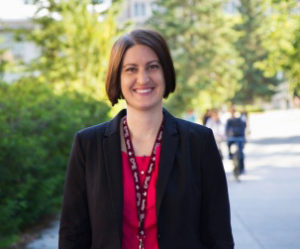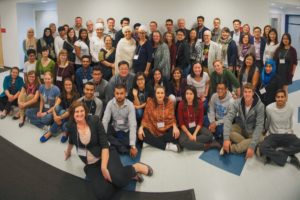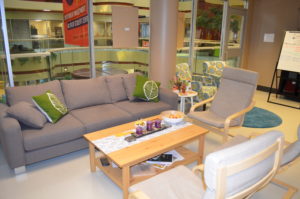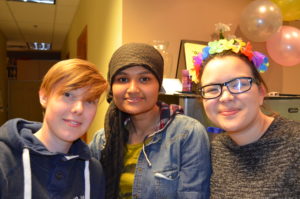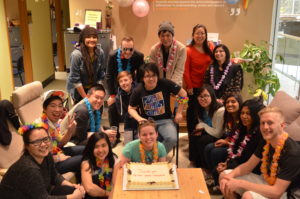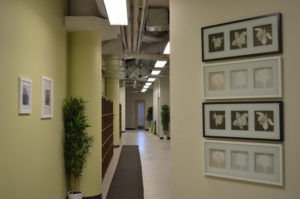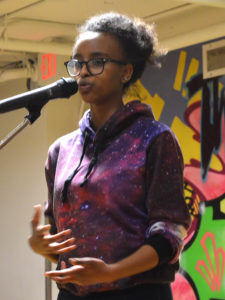Public universities often prove to be microcosms of the diverse wider society around them, with the potential to become boiling pots of intense encounters. On the other hand, they can be the perfect setting for the development of positive, life-changing intercultural and interfaith relationships.
Adriana Tulissi is Manager of the University of Calgary’s Faith and Spirituality Centre. She is determined, with the help of her staff, student volunteers and community connections, to foster the latter scenario. What they are accomplishing together is bold, inspiring and, in many ways, remarkable.
Tulissi recently gave us a tour of the Centre itself, and also their new multi-faith area on campus called the Vitruvian Space (named after Leonardo da Vinci’s famous multi-limbed image “The Vitruvian Man”). With four multi-purpose rooms of various sizes, the new space is beautifully designed to support spiritual wellness, with capacity for small groups, individual prayer and quiet reflection, as well as bigger gatherings of over 200 students. At almost 4000 square feet, it is probably one of the largest such spaces in a Canadian institution.
After our tour, we sat down and chatted with Tulissi, whose enthusiasm is infectious. Besides telling us about many of the Centre’s initiatives and projects, she also shared her vision of a “religion-positive campus culture”.
Kolbe Times: What is the history of the Faith and Spirituality Centre here at U of C?
Adriana Tulissi: Well, it’s been on campus in some form or another since before the University of Calgary was the University of Calgary – when we were a satellite campus of the University of Alberta. There have been chaplains here since the 1960’s, even before there was a religious studies department. They’ve always done a great job of supporting our students. But about seven or eight years ago the chaplains felt they spending too much time on administration work. They applied for a grant to hire a part time staff person, and that’s where I came in. Now I’m fulltime, and we have four other staff as well, so a lot has changed. We are our own department now, and we have a budget from the university. We now have 15 chaplains from many different faith backgrounds, and they still do a fantastic job of providing spiritual support and guidance to our U. of C. community, as well as crisis support. But in addition to that, we wanted to have a focus on being change-makers. We wanted to help students delve into social justice, and consider how they can wear more than just their academic hat when they leave here.
Kolbe Times: Your website mentions that part of your mission is to create a “religion-positive campus culture”. What do you mean by that?
Adriana Tulissi: I first heard that phrase from a colleague of mine, Dr. Sara Parks, who is the Director of McGill University’s Office of Religious and Spiritual Life. It’s an interesting way of talking about something that I’ve observed, here on campus and also generally in Canadian culture – which is a fairly fervent “anti-religiousness”. Also, I want to counter the idea that those who are agnostic or atheist are necessarily anti-religious, because that’s not true. However, those people who are anti-religious are often quite vocal about it, and capture the media’s attention. We often hear the message that religion has been the cause of all the evil in the world, and that’s not a message that we want to hold here.
Because of the idea in Canadian culture that public and private spheres are separate, any ideas of expressing your religious views tend to get shut down. Frankly, that’s also produced a stigma around expressing your religious views in the classroom, or in co-curricular opportunities on campus. It’s all very tricky if you are a young adult still trying to work out your own beliefs and identity, and also trying to fit in with your peers. So we often hear students who come to our Centre and take part in our activities say, “Ahh…this is the only place on campus where I am free to be religious.”
Now, that doesn’t mean that you have to be religious to come to our space here. Everyone is welcome. But we hope to be an agent of change in opening up the dialogue about religion, and removing the stigma about sharing and discussing your religious life. We want everyone to feel free to be their own authentic selves, whether they are religious or not. In other words, we have the opportunity here to be a starting point. And the hope is that the whole campus will be a place where people will respectfully listen and learn from each other.
I’ve been thinking a lot lately that there’s a difference between knowing and understanding. Often interfaith work is on the “knowing” level, and it’s focused on commonalities. You get together and focus on an issue, like poverty, and you listen to speakers from different faiths. And yes, there are commonalities, but wanting to concentrate only on that is also taking away what is unique and different from faith communities. We need to learn about the differences as well! It’s not always safe and comfortable, and that’s why we don’t often go there. But when you actually develop friendships, you build trust and are able to delve into that other space.
You might start to move into differences of equity, looking at a social justice model. You might start to ask, “How do I make sure that my fellow human beings aren’t marginalized?” You’re traveling into deeper territory, going beyond celebrating commonalities. It’s a process – and of course you have to start with knowing and celebrating. That’s kind of the easy part. But you have to lose your fear and be willing to go into harder places, and yet stay in relationship. It’s hard work, and it can be emotionally exhausting, but almost always in a good way.
We also decided that we want to provide a place where students can respond to things that are going on in the world. So, for instance, when there was the shooting in the Quebec City mosque in February, we had a gathering of remembrance for the victims. We’ve had talking circles about the impact of the travel ban into the U.S. Students often tell us that they feel disempowered about things they see in the news, and they have emotional responses and want to do something … but they don’t know where to go. So we say, come here to the Centre and let’s talk about it.
Kolbe Times: What excites you most about working here?
Adriana Tulissi: I have an undergraduate degree and a Master of Arts in Religious Studies, and I realized when I started working here, and began meeting students from so many different faith backgrounds, that I really didn’t know anything about religion! When I was studying, the classes I took and the books I read categorized and reduced religions into neat tiny little boxes that had no complexity. I can really see now the ‘disconnect’ between the pedagogy of a religious studies department, and what we do here. So what drives me is when I ask myself, “How can I empower students to care about the world around them?”
Around here, we’re continually trying to challenge viewpoints and bring up different perspectives. We don’t want students to respond to the injustice they see around them by ignoring it. And yet that’s what often happens. Instead, we want to be a place where students can channel their energies into doing something, or maybe talk with people from another culture and faith who also have questions. It’s not easy to affect systemic change, but that’s our goal.
This place challenges me daily, which I thrive on. My day never looks the same, ever. And I also love strategizing about how we can interact in the community outside our campus.
Kolbe Times: You have lots of things going on here, but we know one initiative that you’re especially excited about is the Kaleidoscope Project.
Adriana Tulissi: Yes, you’re right – we’re a busy place, with lots of programs and special events. But the Kaleidoscope Project is a really great opportunity for students to sink their teeth into learning about interreligious and diversity issues, with the vision to create a more inclusive campus community. There are four pre-program workshops that help students understand about the public sphere and secularism, how public policy is formed, and introducing the Charter of Rights and Freedoms. We move into a discussion of pluralism, how to bridge secularism and religion, and how to get involved, in a productive way, in interreligious action and dialogue. Then the students have the chance to actually be involved in intercultural engagement and conversation, taking part in activities and gaining skills.
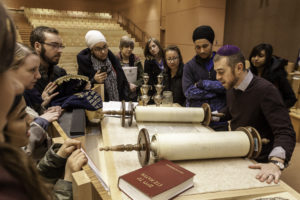
Kaleidoscope Project participants at Beth Tzedec Synagogue with Rabbi Corber. Robert Massey Photography
After the workshops, during Reading Break, we stay at the FCJ Christian Life Centre in downtown Calgary. We sleep and eat and hang out together, while engaging with a different religious community each day: Hinduism, Sikhism, Christianity, Buddhism, Islam and Judaism. What makes it different from a Religious Studies class, where you often get the history, the social context, and the theology, is that in the Kaleidoscope Project we actually focus on having someone come and talk about their personal experience of being a person of faith in their community. So they tell us what a day looks like – what they eat, what they wear, what they do all day, what are their private spiritual practices, how they worship together in their community, and how their personal faith interacts in the public sphere. We then go visit a variety of sacred spaces in Calgary, and we purposefully try to show the breadth of observance in each faith community. So, for instance, to understand more about Christianity, we might go to a Coptic Orthodox church as well as an Evangelical youth service. And when we explore Islam, we visit both an Ismaili community and Sunni community. All this really helps to break down myths and stereotypes.
The last step is teaching them a process to deal with issues in the area of diversity, issues that have come up in the public sphere. It’s not about figuring out the “right” answer – it’s more about asking, “If this issue ended up on your desk, how would you handle it? What stakeholders should you talk to? What preconceived ideas of your own might you need to question?” We talk about good ways to deal with these issues, and also give them lots of time to reflect and journal. Then we have discussions about which areas challenged them, and which areas resonated with them, and invite our chaplains to come and debrief with the students. They’re encouraged to do a lot of self-reflection in pairs and in talking circles about questions like, “What are my own values? What’s important to me? What scares me? What do I want to stand up for?”
What we’re trying to do here is help students become global citizens. We’re equipping them at a critical point in their lives with the skills and awareness they need to engage with “difference”.
And we’ve just moved our Kaleidoscope Program into a Continuing Education course that we’re running in May and August, so it will be available to the public. I’m really excited about that.
Kolbe Times: Your new Vitruvian Space is an amazing addition to the campus, too.
Adriana Tulissi: It’s been tremendous. It opened last January, and we have about 30 bookings a week for use of the space. It’s great to see students coming together after classes and making use of it, and the university staff uses it a lot, too. You’ll find everything from drum circles to yoga classes – and things like prayer gatherings, speaker sessions, mindfulness workshops, study groups and worship services. And of course there are spaces for people to simply be by themselves to think and reflect and pray. It’s a place for our campus community to come aside and interact with others, or just be quiet for a while – to decompress and get well. It’s open 7 days a week, 7 a.m. to 10 p.m., 365 days a year. We provide prayer mats, yoga mats and yoga pillows, and there are ablution stations for men and women, used by members of the Muslim faith who need to cleanse before prayers. Our Muslim chaplain says they are like “Cadillac versions”, much nicer than those in the mosque!
Students can book rooms at the Vitruvian Space ahead of time, or just drop in and see what’s available. We also have two multi-faith spaces in MacEwan Student Centre on campus, and a drop-in space at the Health Sciences building at the Foothills Hospital for our students and staff who are over there.
There’s a great need for places like this. We see over 2,200 students each week who seek us out, which is a big increase since I’ve been here. I think its partly because there’s more awareness of our Centre’s role on campus, and also because of our very diverse population. And there is a lot of stress in people’s lives these days, as we all know. But we’re finding that many young people are being pro-active about caring for themselves, and pro-active about searching for answers to their questions.
Kolbe Times: As Manager of the Faith & Spirituality Centre here, what are your dreams for the future?
Adriana Tulissi: We hope to build an academic course out of the Kaleidoscope Program, and eventually a major and a certificate program. I do want to see this in the academic world, because we’re doing things differently. To learn and truly engage in this way is pretty unique. Most university courses on religion are overly focused on being very objective in their methods and teaching style, and so the sense is that to have someone come and actually talk about their own religious experience would be too “subjective”.
And I’d love for us to have a building of our own! A student has even designed it for me already. One day I’d like to see this campus culture, and the Canadian culture around us, become more welcoming and inclusive of people of faith. I would love it if someone could walk down the hallways of our university and totally be proud and excited about their religious identity, and not scared to reveal it. I would love for the university and our society as a whole to anticipate change, as opposed to reacting and responding when something happens.
Kolbe Times: Adriana, thank you for your time. It’s really encouraging to hear about the great things going on here.
To find out more, visit the Faith & Spirituality Centre website.
Find more information or register for The Kaleidoscope Project’s Continuing Education course in May or August 2017.


